Frankenstein: Relevance of Mary Shelley's Novel Today
VerifiedAdded on 2022/08/30
|6
|1622
|23
Essay
AI Summary
This essay delves into the enduring relevance of Mary Shelley's Frankenstein, a novel that continues to resonate with contemporary society. It examines the core themes of the novel, including the dangers of unchecked scientific ambition, the relationship between humanity and nature, and the ethical responsibilities of creators. The essay analyzes the character of Victor Frankenstein, highlighting his pursuit of knowledge and the tragic consequences of his creation. It explores the novel's connections to both Gothic and Romantic literary traditions, and emphasizes the importance of understanding human limitations and the potential for unforeseen outcomes in scientific endeavors. The analysis also touches upon the significance of communication and the search for belonging, as exemplified by the creature. The essay concludes by asserting the novel's continued relevance in an age of rapid technological advancements, urging readers to consider the ethical implications of scientific progress and the importance of responsible innovation.
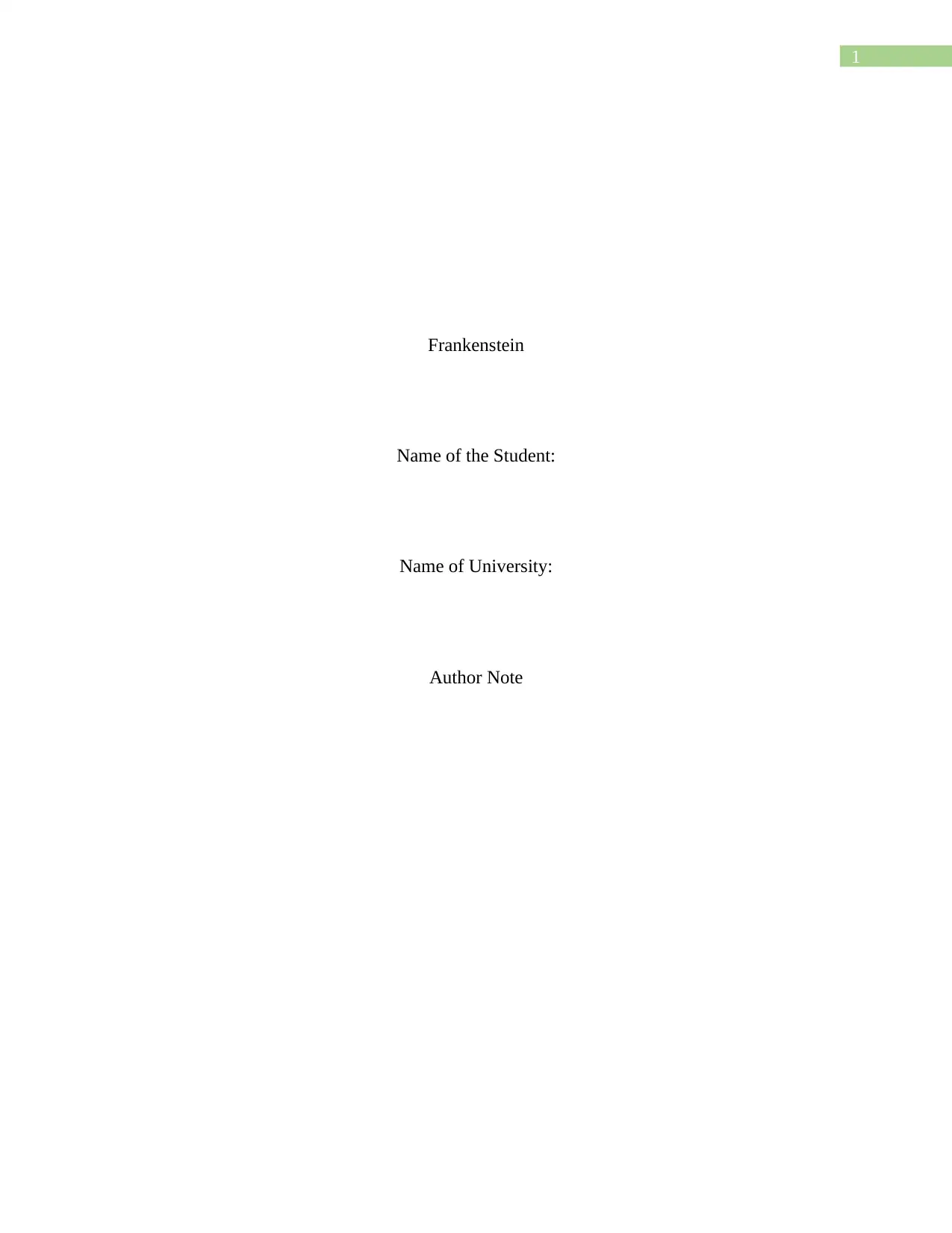
1
Frankenstein
Name of the Student:
Name of University:
Author Note
Frankenstein
Name of the Student:
Name of University:
Author Note
Paraphrase This Document
Need a fresh take? Get an instant paraphrase of this document with our AI Paraphraser
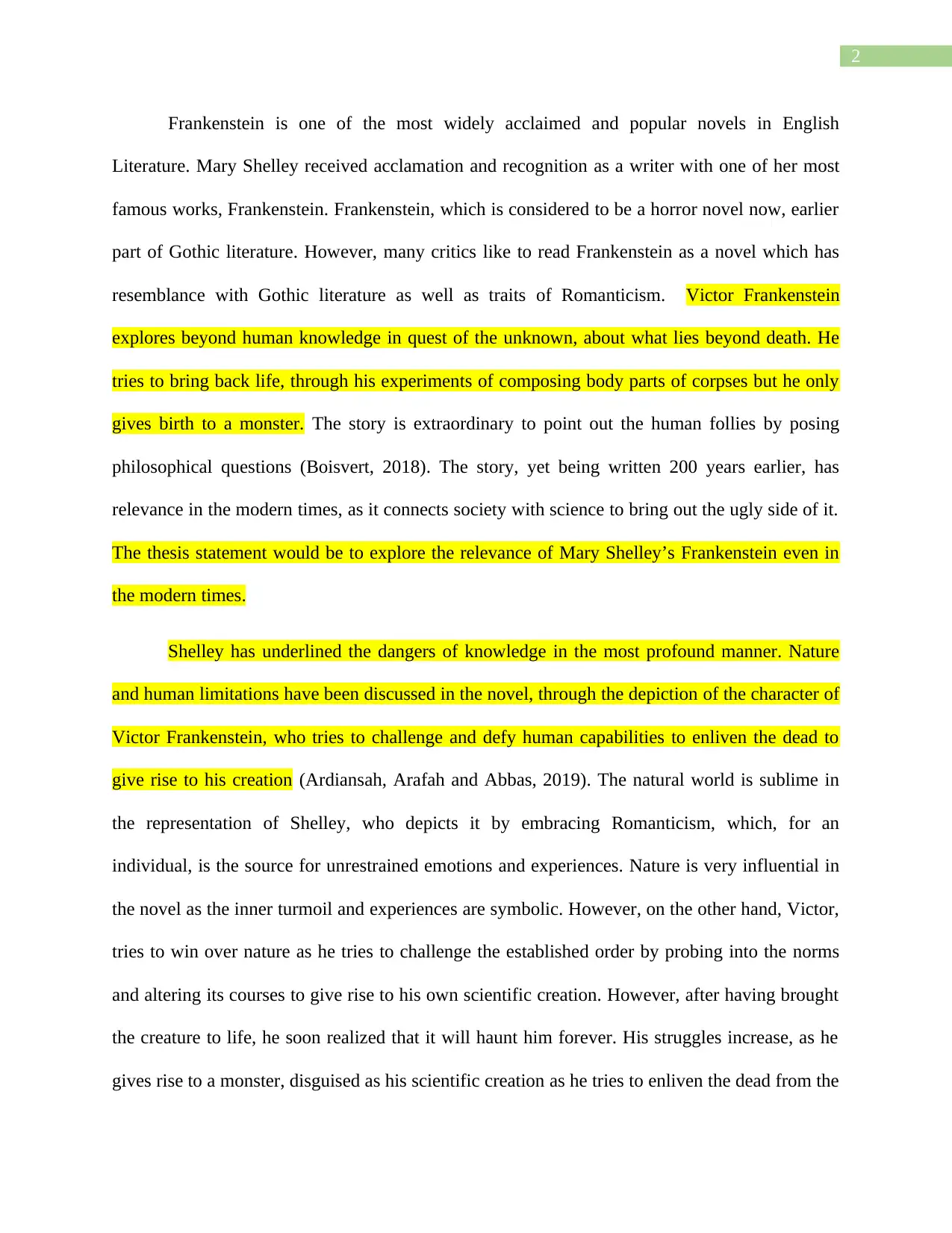
2
Frankenstein is one of the most widely acclaimed and popular novels in English
Literature. Mary Shelley received acclamation and recognition as a writer with one of her most
famous works, Frankenstein. Frankenstein, which is considered to be a horror novel now, earlier
part of Gothic literature. However, many critics like to read Frankenstein as a novel which has
resemblance with Gothic literature as well as traits of Romanticism. Victor Frankenstein
explores beyond human knowledge in quest of the unknown, about what lies beyond death. He
tries to bring back life, through his experiments of composing body parts of corpses but he only
gives birth to a monster. The story is extraordinary to point out the human follies by posing
philosophical questions (Boisvert, 2018). The story, yet being written 200 years earlier, has
relevance in the modern times, as it connects society with science to bring out the ugly side of it.
The thesis statement would be to explore the relevance of Mary Shelley’s Frankenstein even in
the modern times.
Shelley has underlined the dangers of knowledge in the most profound manner. Nature
and human limitations have been discussed in the novel, through the depiction of the character of
Victor Frankenstein, who tries to challenge and defy human capabilities to enliven the dead to
give rise to his creation (Ardiansah, Arafah and Abbas, 2019). The natural world is sublime in
the representation of Shelley, who depicts it by embracing Romanticism, which, for an
individual, is the source for unrestrained emotions and experiences. Nature is very influential in
the novel as the inner turmoil and experiences are symbolic. However, on the other hand, Victor,
tries to win over nature as he tries to challenge the established order by probing into the norms
and altering its courses to give rise to his own scientific creation. However, after having brought
the creature to life, he soon realized that it will haunt him forever. His struggles increase, as he
gives rise to a monster, disguised as his scientific creation as he tries to enliven the dead from the
Frankenstein is one of the most widely acclaimed and popular novels in English
Literature. Mary Shelley received acclamation and recognition as a writer with one of her most
famous works, Frankenstein. Frankenstein, which is considered to be a horror novel now, earlier
part of Gothic literature. However, many critics like to read Frankenstein as a novel which has
resemblance with Gothic literature as well as traits of Romanticism. Victor Frankenstein
explores beyond human knowledge in quest of the unknown, about what lies beyond death. He
tries to bring back life, through his experiments of composing body parts of corpses but he only
gives birth to a monster. The story is extraordinary to point out the human follies by posing
philosophical questions (Boisvert, 2018). The story, yet being written 200 years earlier, has
relevance in the modern times, as it connects society with science to bring out the ugly side of it.
The thesis statement would be to explore the relevance of Mary Shelley’s Frankenstein even in
the modern times.
Shelley has underlined the dangers of knowledge in the most profound manner. Nature
and human limitations have been discussed in the novel, through the depiction of the character of
Victor Frankenstein, who tries to challenge and defy human capabilities to enliven the dead to
give rise to his creation (Ardiansah, Arafah and Abbas, 2019). The natural world is sublime in
the representation of Shelley, who depicts it by embracing Romanticism, which, for an
individual, is the source for unrestrained emotions and experiences. Nature is very influential in
the novel as the inner turmoil and experiences are symbolic. However, on the other hand, Victor,
tries to win over nature as he tries to challenge the established order by probing into the norms
and altering its courses to give rise to his own scientific creation. However, after having brought
the creature to life, he soon realized that it will haunt him forever. His struggles increase, as he
gives rise to a monster, disguised as his scientific creation as he tries to enliven the dead from the
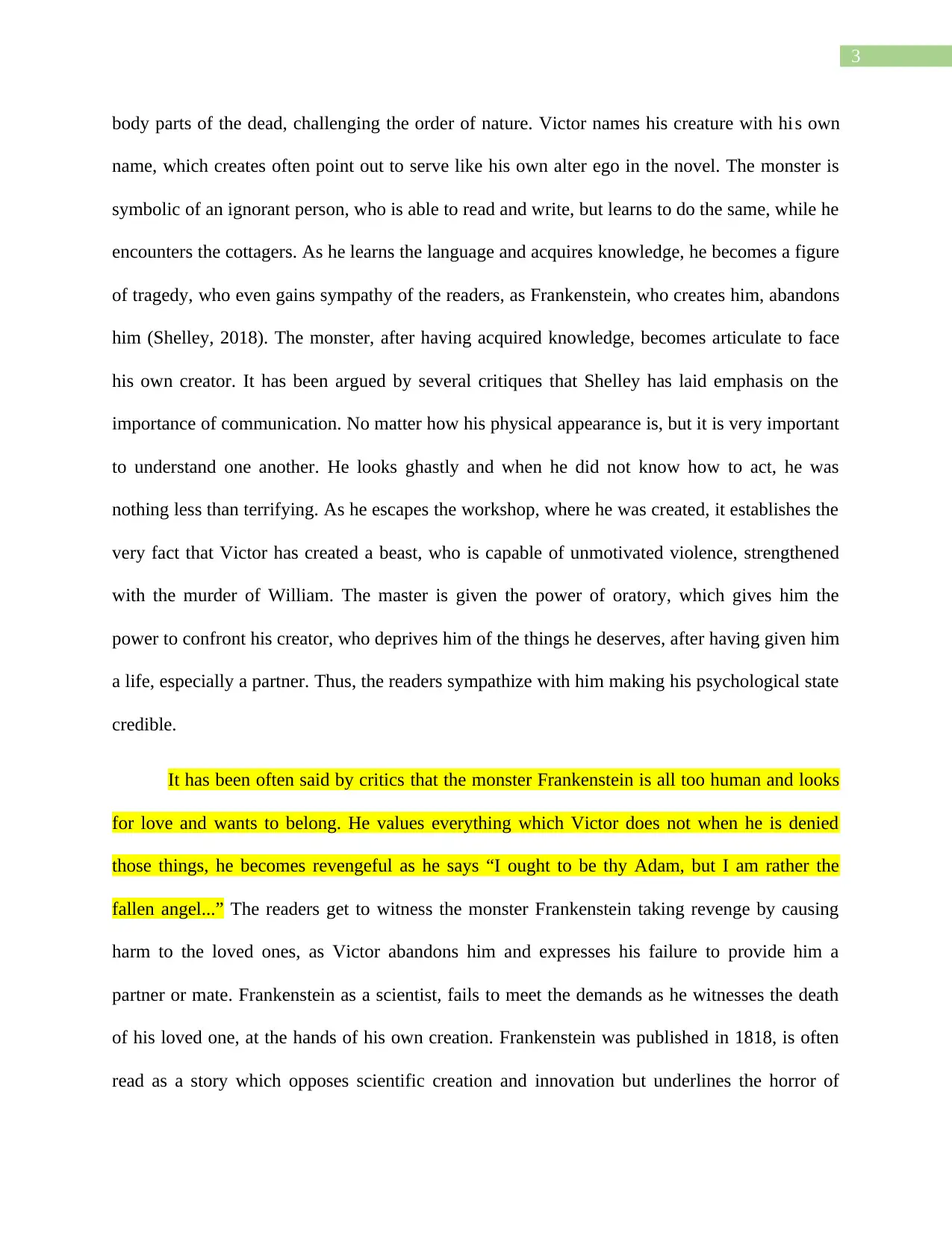
3
body parts of the dead, challenging the order of nature. Victor names his creature with his own
name, which creates often point out to serve like his own alter ego in the novel. The monster is
symbolic of an ignorant person, who is able to read and write, but learns to do the same, while he
encounters the cottagers. As he learns the language and acquires knowledge, he becomes a figure
of tragedy, who even gains sympathy of the readers, as Frankenstein, who creates him, abandons
him (Shelley, 2018). The monster, after having acquired knowledge, becomes articulate to face
his own creator. It has been argued by several critiques that Shelley has laid emphasis on the
importance of communication. No matter how his physical appearance is, but it is very important
to understand one another. He looks ghastly and when he did not know how to act, he was
nothing less than terrifying. As he escapes the workshop, where he was created, it establishes the
very fact that Victor has created a beast, who is capable of unmotivated violence, strengthened
with the murder of William. The master is given the power of oratory, which gives him the
power to confront his creator, who deprives him of the things he deserves, after having given him
a life, especially a partner. Thus, the readers sympathize with him making his psychological state
credible.
It has been often said by critics that the monster Frankenstein is all too human and looks
for love and wants to belong. He values everything which Victor does not when he is denied
those things, he becomes revengeful as he says “I ought to be thy Adam, but I am rather the
fallen angel...” The readers get to witness the monster Frankenstein taking revenge by causing
harm to the loved ones, as Victor abandons him and expresses his failure to provide him a
partner or mate. Frankenstein as a scientist, fails to meet the demands as he witnesses the death
of his loved one, at the hands of his own creation. Frankenstein was published in 1818, is often
read as a story which opposes scientific creation and innovation but underlines the horror of
body parts of the dead, challenging the order of nature. Victor names his creature with his own
name, which creates often point out to serve like his own alter ego in the novel. The monster is
symbolic of an ignorant person, who is able to read and write, but learns to do the same, while he
encounters the cottagers. As he learns the language and acquires knowledge, he becomes a figure
of tragedy, who even gains sympathy of the readers, as Frankenstein, who creates him, abandons
him (Shelley, 2018). The monster, after having acquired knowledge, becomes articulate to face
his own creator. It has been argued by several critiques that Shelley has laid emphasis on the
importance of communication. No matter how his physical appearance is, but it is very important
to understand one another. He looks ghastly and when he did not know how to act, he was
nothing less than terrifying. As he escapes the workshop, where he was created, it establishes the
very fact that Victor has created a beast, who is capable of unmotivated violence, strengthened
with the murder of William. The master is given the power of oratory, which gives him the
power to confront his creator, who deprives him of the things he deserves, after having given him
a life, especially a partner. Thus, the readers sympathize with him making his psychological state
credible.
It has been often said by critics that the monster Frankenstein is all too human and looks
for love and wants to belong. He values everything which Victor does not when he is denied
those things, he becomes revengeful as he says “I ought to be thy Adam, but I am rather the
fallen angel...” The readers get to witness the monster Frankenstein taking revenge by causing
harm to the loved ones, as Victor abandons him and expresses his failure to provide him a
partner or mate. Frankenstein as a scientist, fails to meet the demands as he witnesses the death
of his loved one, at the hands of his own creation. Frankenstein was published in 1818, is often
read as a story which opposes scientific creation and innovation but underlines the horror of
⊘ This is a preview!⊘
Do you want full access?
Subscribe today to unlock all pages.

Trusted by 1+ million students worldwide
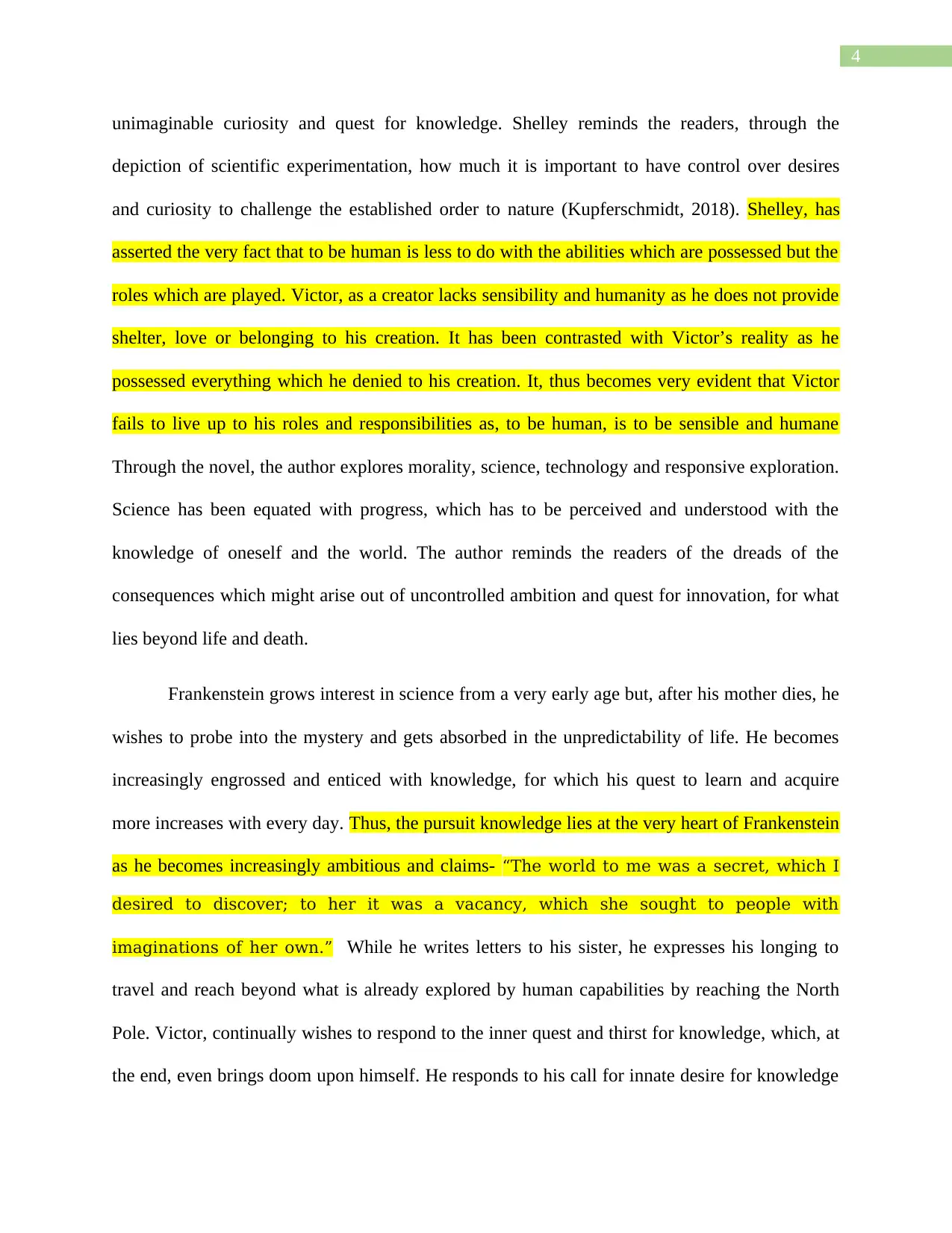
4
unimaginable curiosity and quest for knowledge. Shelley reminds the readers, through the
depiction of scientific experimentation, how much it is important to have control over desires
and curiosity to challenge the established order to nature (Kupferschmidt, 2018). Shelley, has
asserted the very fact that to be human is less to do with the abilities which are possessed but the
roles which are played. Victor, as a creator lacks sensibility and humanity as he does not provide
shelter, love or belonging to his creation. It has been contrasted with Victor’s reality as he
possessed everything which he denied to his creation. It, thus becomes very evident that Victor
fails to live up to his roles and responsibilities as, to be human, is to be sensible and humane
Through the novel, the author explores morality, science, technology and responsive exploration.
Science has been equated with progress, which has to be perceived and understood with the
knowledge of oneself and the world. The author reminds the readers of the dreads of the
consequences which might arise out of uncontrolled ambition and quest for innovation, for what
lies beyond life and death.
Frankenstein grows interest in science from a very early age but, after his mother dies, he
wishes to probe into the mystery and gets absorbed in the unpredictability of life. He becomes
increasingly engrossed and enticed with knowledge, for which his quest to learn and acquire
more increases with every day. Thus, the pursuit knowledge lies at the very heart of Frankenstein
as he becomes increasingly ambitious and claims- “The world to me was a secret, which I
desired to discover; to her it was a vacancy, which she sought to people with
imaginations of her own.” While he writes letters to his sister, he expresses his longing to
travel and reach beyond what is already explored by human capabilities by reaching the North
Pole. Victor, continually wishes to respond to the inner quest and thirst for knowledge, which, at
the end, even brings doom upon himself. He responds to his call for innate desire for knowledge
unimaginable curiosity and quest for knowledge. Shelley reminds the readers, through the
depiction of scientific experimentation, how much it is important to have control over desires
and curiosity to challenge the established order to nature (Kupferschmidt, 2018). Shelley, has
asserted the very fact that to be human is less to do with the abilities which are possessed but the
roles which are played. Victor, as a creator lacks sensibility and humanity as he does not provide
shelter, love or belonging to his creation. It has been contrasted with Victor’s reality as he
possessed everything which he denied to his creation. It, thus becomes very evident that Victor
fails to live up to his roles and responsibilities as, to be human, is to be sensible and humane
Through the novel, the author explores morality, science, technology and responsive exploration.
Science has been equated with progress, which has to be perceived and understood with the
knowledge of oneself and the world. The author reminds the readers of the dreads of the
consequences which might arise out of uncontrolled ambition and quest for innovation, for what
lies beyond life and death.
Frankenstein grows interest in science from a very early age but, after his mother dies, he
wishes to probe into the mystery and gets absorbed in the unpredictability of life. He becomes
increasingly engrossed and enticed with knowledge, for which his quest to learn and acquire
more increases with every day. Thus, the pursuit knowledge lies at the very heart of Frankenstein
as he becomes increasingly ambitious and claims- “The world to me was a secret, which I
desired to discover; to her it was a vacancy, which she sought to people with
imaginations of her own.” While he writes letters to his sister, he expresses his longing to
travel and reach beyond what is already explored by human capabilities by reaching the North
Pole. Victor, continually wishes to respond to the inner quest and thirst for knowledge, which, at
the end, even brings doom upon himself. He responds to his call for innate desire for knowledge
Paraphrase This Document
Need a fresh take? Get an instant paraphrase of this document with our AI Paraphraser
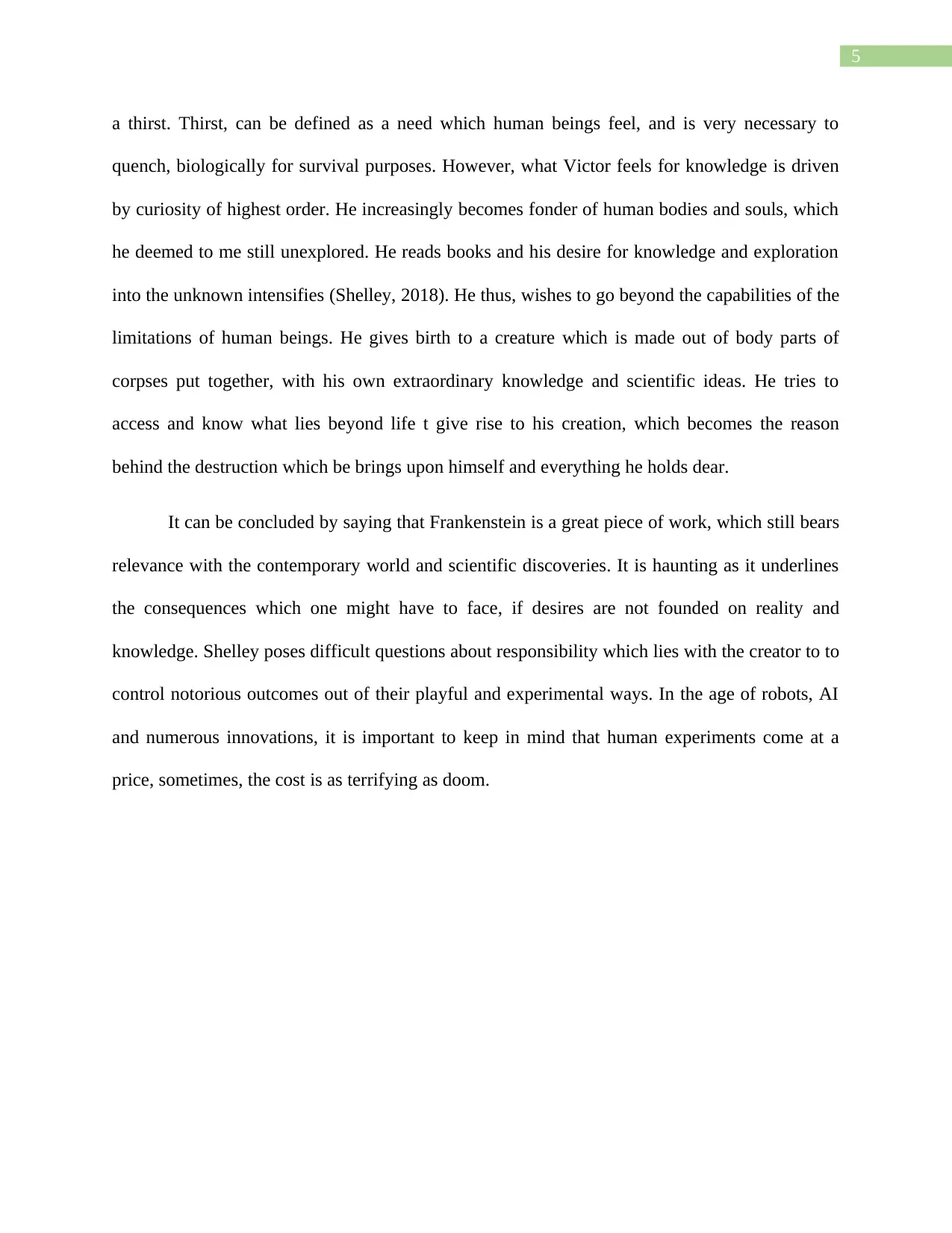
5
a thirst. Thirst, can be defined as a need which human beings feel, and is very necessary to
quench, biologically for survival purposes. However, what Victor feels for knowledge is driven
by curiosity of highest order. He increasingly becomes fonder of human bodies and souls, which
he deemed to me still unexplored. He reads books and his desire for knowledge and exploration
into the unknown intensifies (Shelley, 2018). He thus, wishes to go beyond the capabilities of the
limitations of human beings. He gives birth to a creature which is made out of body parts of
corpses put together, with his own extraordinary knowledge and scientific ideas. He tries to
access and know what lies beyond life t give rise to his creation, which becomes the reason
behind the destruction which be brings upon himself and everything he holds dear.
It can be concluded by saying that Frankenstein is a great piece of work, which still bears
relevance with the contemporary world and scientific discoveries. It is haunting as it underlines
the consequences which one might have to face, if desires are not founded on reality and
knowledge. Shelley poses difficult questions about responsibility which lies with the creator to to
control notorious outcomes out of their playful and experimental ways. In the age of robots, AI
and numerous innovations, it is important to keep in mind that human experiments come at a
price, sometimes, the cost is as terrifying as doom.
a thirst. Thirst, can be defined as a need which human beings feel, and is very necessary to
quench, biologically for survival purposes. However, what Victor feels for knowledge is driven
by curiosity of highest order. He increasingly becomes fonder of human bodies and souls, which
he deemed to me still unexplored. He reads books and his desire for knowledge and exploration
into the unknown intensifies (Shelley, 2018). He thus, wishes to go beyond the capabilities of the
limitations of human beings. He gives birth to a creature which is made out of body parts of
corpses put together, with his own extraordinary knowledge and scientific ideas. He tries to
access and know what lies beyond life t give rise to his creation, which becomes the reason
behind the destruction which be brings upon himself and everything he holds dear.
It can be concluded by saying that Frankenstein is a great piece of work, which still bears
relevance with the contemporary world and scientific discoveries. It is haunting as it underlines
the consequences which one might have to face, if desires are not founded on reality and
knowledge. Shelley poses difficult questions about responsibility which lies with the creator to to
control notorious outcomes out of their playful and experimental ways. In the age of robots, AI
and numerous innovations, it is important to keep in mind that human experiments come at a
price, sometimes, the cost is as terrifying as doom.
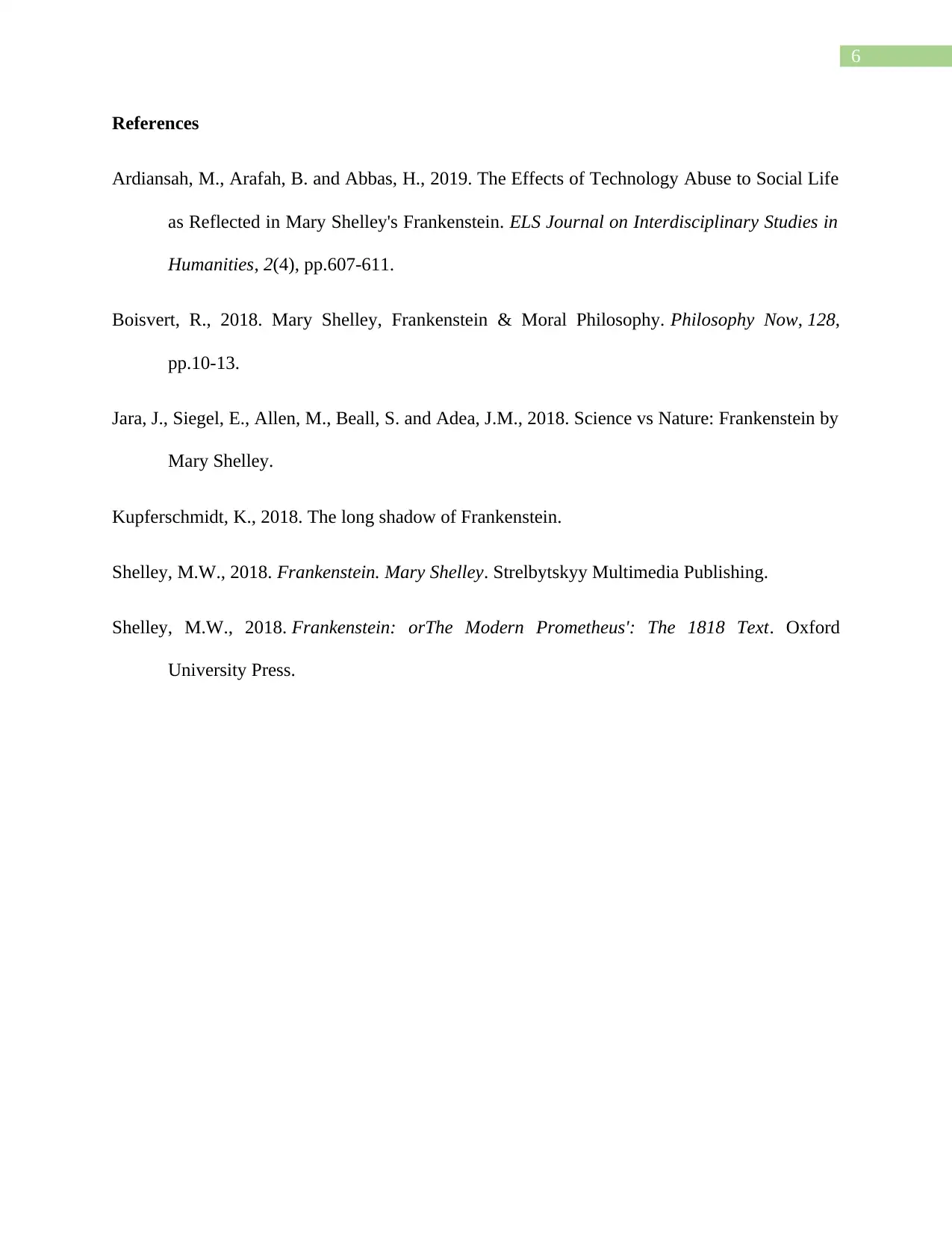
6
References
Ardiansah, M., Arafah, B. and Abbas, H., 2019. The Effects of Technology Abuse to Social Life
as Reflected in Mary Shelley's Frankenstein. ELS Journal on Interdisciplinary Studies in
Humanities, 2(4), pp.607-611.
Boisvert, R., 2018. Mary Shelley, Frankenstein & Moral Philosophy. Philosophy Now, 128,
pp.10-13.
Jara, J., Siegel, E., Allen, M., Beall, S. and Adea, J.M., 2018. Science vs Nature: Frankenstein by
Mary Shelley.
Kupferschmidt, K., 2018. The long shadow of Frankenstein.
Shelley, M.W., 2018. Frankenstein. Mary Shelley. Strelbytskyy Multimedia Publishing.
Shelley, M.W., 2018. Frankenstein: orThe Modern Prometheus': The 1818 Text. Oxford
University Press.
References
Ardiansah, M., Arafah, B. and Abbas, H., 2019. The Effects of Technology Abuse to Social Life
as Reflected in Mary Shelley's Frankenstein. ELS Journal on Interdisciplinary Studies in
Humanities, 2(4), pp.607-611.
Boisvert, R., 2018. Mary Shelley, Frankenstein & Moral Philosophy. Philosophy Now, 128,
pp.10-13.
Jara, J., Siegel, E., Allen, M., Beall, S. and Adea, J.M., 2018. Science vs Nature: Frankenstein by
Mary Shelley.
Kupferschmidt, K., 2018. The long shadow of Frankenstein.
Shelley, M.W., 2018. Frankenstein. Mary Shelley. Strelbytskyy Multimedia Publishing.
Shelley, M.W., 2018. Frankenstein: orThe Modern Prometheus': The 1818 Text. Oxford
University Press.
⊘ This is a preview!⊘
Do you want full access?
Subscribe today to unlock all pages.

Trusted by 1+ million students worldwide
1 out of 6
Related Documents
Your All-in-One AI-Powered Toolkit for Academic Success.
+13062052269
info@desklib.com
Available 24*7 on WhatsApp / Email
![[object Object]](/_next/static/media/star-bottom.7253800d.svg)
Unlock your academic potential
Copyright © 2020–2026 A2Z Services. All Rights Reserved. Developed and managed by ZUCOL.





